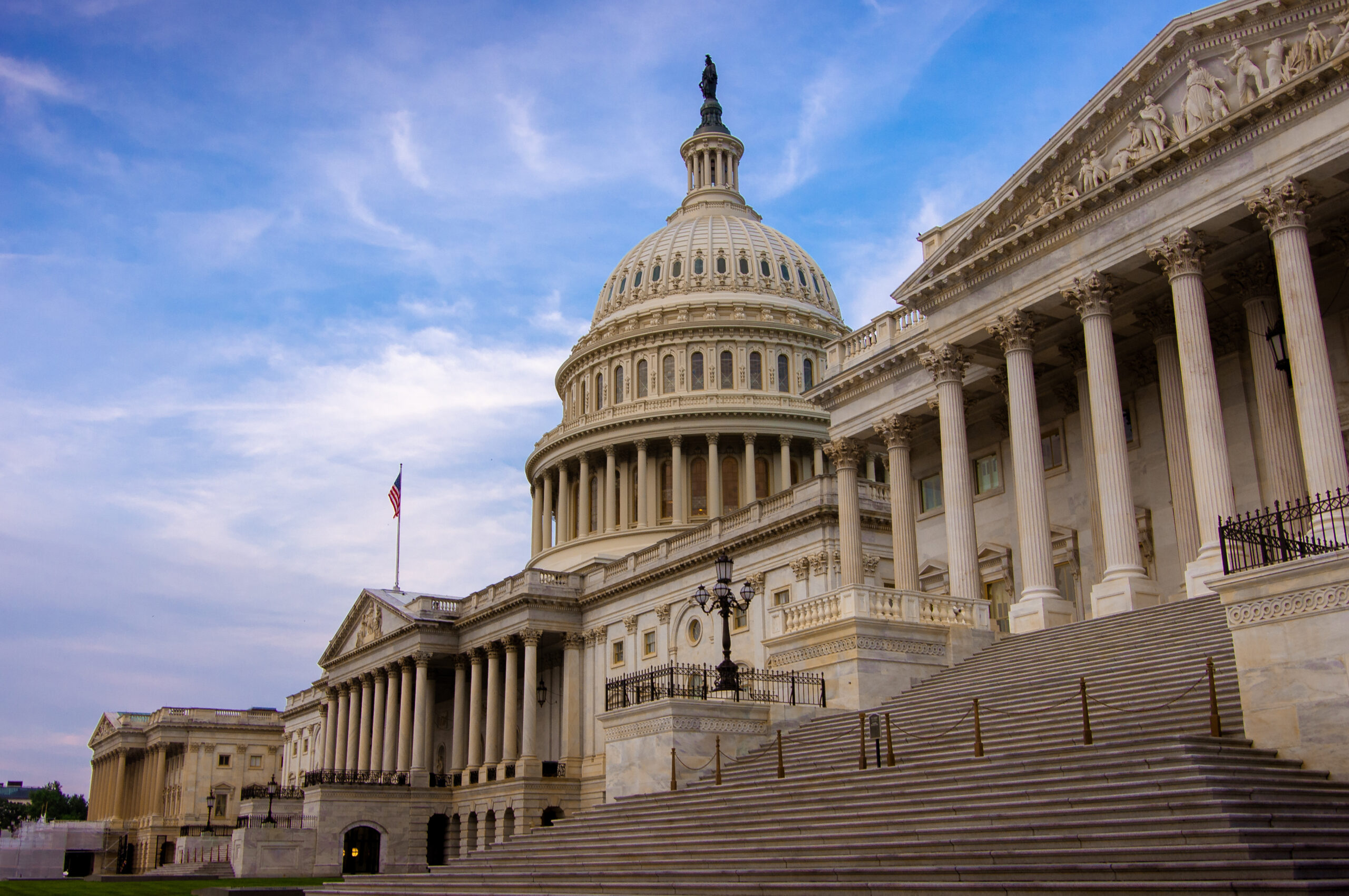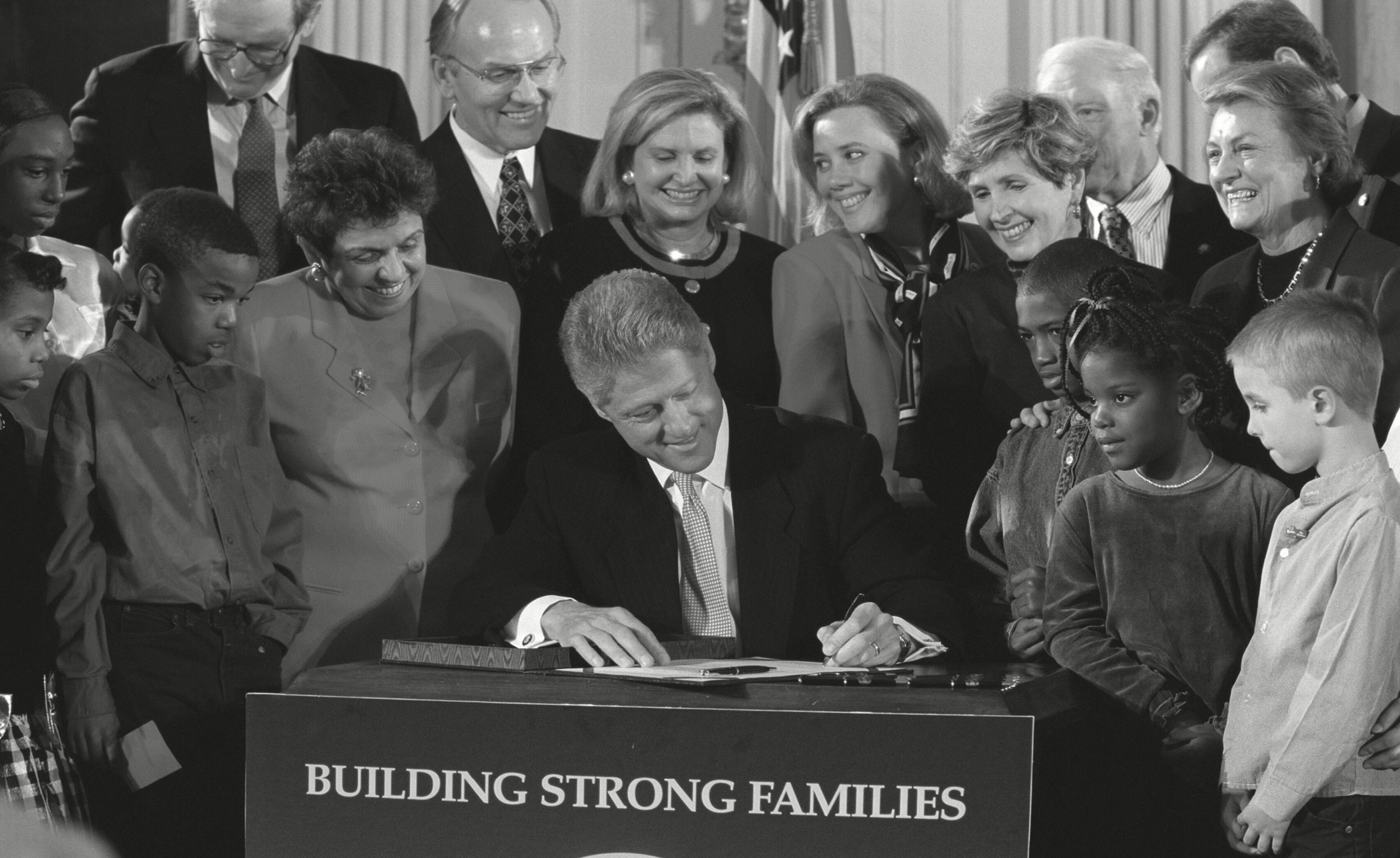NCFA’s 2020 Legislative Priorities
Adoption Advocate No. 139
The start of any New Year is usually considered a milestone for people and organizations alike, but for National Council For Adoption (NCFA), 2020 takes on even more significance than usual. Not only will NCFA begin 2020 with strategic goals for our organization and our mission that we will pursue and track over the next 12 months, but we will also begin a year-long celebration of the founding of NCFA in 1980—and of 40 years of achievement in representing the cause of adoption.
NCFA was originally founded by adoption advocates to focus on domestic adoption. While domestic adoption remains an important area of focus, over the years our mission has expanded to include permanency options for children and youth in foster care, and intercountry adoption. For all of our 40 years, NCFA has been passionately committed to the belief that every child deserves to thrive in a nurturing, permanent family – and it’s this notion that has informed virtually every activity that NCFA has undertaken since our first day of operation. Today, NCFA is a global adoption advocacy nonprofit that promotes a culture of adoption through education, research, collaboration, and legislative action.
NCFA’s role in state and federal legislative activity is well-known. In fact, many people associate us most closely with our work with federal policymakers on Capitol Hill, and internationally. NCFA has been instrumental in the passage of numerous landmark child welfare laws that include the adoption tax credit, the Multi-Ethnic Placement Act, the Adoption and Safe Families Act, the Help Haiti Act, and the Fostering Connections to Success and Increasing Adoptions Act, along with our unparalleled role in helping shape adoption policy and best practices in all types of adoption, both domestically and globally—for example, our work with the Hague Special Commission.
In 2020, NCFA will continue to support laws, policies, and practices that ensure adoption remains a viable option for children and families here in the U.S. and around the world. Likewise, we will continue to work to ensure that these laws, policies, and practices result in achieving safe permanency through adoption for children in need of a family and that adoption is ethical, transparent, and works in the best interests of children, birth parents, and adoptive families.
2020 Legislative Priorities
Each year, NCFA staff, Board, and consultants assess the most critical needs in adoption to develop a strategic plan for addressing existing legislation that NCFA will support as well as the potential for new legislation for which we will stake out or advance a public position. This legislative strategy is Board-approved and helps NCFA better allocate resources, effectively direct our advocacy efforts, identify areas for collaboration with others, and discipline ourselves to remain on mission. No doubt, NCFA will be asked to provide input and support to new legislative goals, and there will be carryover legislation from the 116th Congress that NCFA has already supported and will continue to support.
As a matter of policy, NCFA remains committed to advancing best and more uniform practices in all types of adoption1. We will continue efforts to prohibit the unregulated custody transfers of children as we work on model state legislation with the Uniform Law Commission and/or on the Safe Home Act at the federal level. NCFA will also continue our commitment to remove barriers that prevent children who are awaiting adoption in foster care from being adopted and continue to ensure that post-adoption support services to families created through adoption remain a priority and accessible to them.
The following four legislative acts, however, will be at the center of our policy strategy for the next year:
The Adoption Tax Credit Refundability Act2 (S.1652, H.R. 2965)
NCFA has long championed the adoption tax credit as a means to help more families afford the high cost of adopting domestically and internationally – and although adopting from foster care results in little or no cost to the family, the tax credit is an important incentive for families adopting children who are currently in foster care and awaiting adoption.
In tax years 2010 and 2011, the adoption tax credit was refundable, meaning that the family adopting was eligible to receive the full refund regardless of their tax liability. In 2012, the adoption tax credit returned as a non-refundable tax credit. The adoption tax credit was made a permanent part of the tax code in 20123 but faced elimination in the Tax Cuts and Jobs Act of 2017. A diverse group of advocates that included NCFA were successful in saving the adoption tax credit, but it remained nonrefundable.4
NCFA supports returning the adoption tax from its current nonrefundable status to refundability. When the adoption tax credit is refundable it benefits more families and can benefit children in foster care awaiting adoption when it acts as an incentive for a foster family to adopt the child in their care. A one-time refundable tax credit to families adopting children from foster care versus the annual costs of maintaining a child in foster care not only promotes the best interests of the child, but also simultaneously results in a substantial cost savings to the taxpayer. It’s not often that federal legislation results in both the morally superior outcome and the fiscally responsible action, but the Adoption Tax Credit Refundability Act accomplishes both.
In 2020, NCFA will work to see that the Adoption Tax Credit Refundability Act is passed and signed into law.
The Adoptee Citizenship Act (S. 1554, H.R. 2731)
The Adoptee Citizenship Act5 provides very important technical fixes to the Child Citizen Act of 2000, the implementation of which has unintentionally resulted in leaving many thousands of internationally adopted children without citizenship. Both these minor children and those now adults are the legal children of U.S. citizens, living in the U.S. legally, with a specific path to citizenship created for them, but due to a confusing and convoluted visa processing system, some internationally adopted children became U.S. citizens upon touching U.S. soil, while for others their parents were required to take extra steps to complete the citizenship process on behalf of their children. It is to this latter group that the Adoptee Citizenship Act applies: children who were adopted internationally by an American family and who were brought legally to the U.S. for the purpose of adoption, but for whom citizenship has not yet been attained.
These legal children of U.S. citizens are not responsible for their parents’ failure to complete the citizenship process on their behalf. NCFA strongly supports passage of the Adoptee Citizenship Act and will work with a diverse coalition of adoptees and adoption stakeholder organizations to ensure that these internationally adopted Americans achieve the citizenship that is rightfully theirs.
Intercountry Adoption Legislation
NCFA supports a robust, ethical, transparent, and appropriately regulated intercountry adoption process. NCFA’s late founder, Dr. William “Bill” Pierce, was part of the original Hague Special Commission that led to the creation of the Hague Convention on Intercountry Adoption, establishing NCFA as an advocate for orphaned, abandoned, and relinquished children around the world. Although the implementation of the Hague Convention by the U.S. Department of State has resulted in a more uniform standard of practice for intercountry adoption – a standard that was unlikely to be achieved by individual state oversight – it has been NCFA’s position that the State Department’s oversight of intercountry adoption has resulted in the Hague Convention failing to achieve its original goals, and is, in part, responsible for the more than 80 percent decline in the number of international orphans being adopted by American citizens.
Over the past 12 years, Congress has attempted to help clarify what the State Department’s role in advocating and regulating intercountry adoption should be. Several legislative initiatives have been proposed to accomplish this goal – most recently the bipartisan Vulnerable Children and Families Act of 2017,6 which also sought to realign how the U.S. government provides financial aid to millions of vulnerable children around the world. The State Department thus far has opposed Congressional efforts to clarify their responsibilities as the U.S. Central Adoption Authority, and to date, none of these legislative efforts have been successful.
NCFA has proposed a pared-down version of the former Vulnerable Children and Families Act that focuses on more clearly defining what the State Department’s role and responsibilities are as the Central Adoption Authority. This legislation will be mission-specific, recognize a child’s right to a family, affirm ethical and legal intercountry adoption as a viable and beneficial solution for the world’s orphans, and align the State Department’s intercountry adoption priorities with what legislators originally intended when they passed the Intercountry Adoption Act of 2000.
In addition to working closely with Congress and other stakeholder organizations to draft this legislation, NCFA will continue its previous support of the Intercountry Adoption Advisory Committee Act (S.363)7 and the Intercountry Adoption Information Act8 (S.938, H.R. 1952).
National Putative Father Registry
One of the biggest challenges with finalizing adoptions is identifying biological fathers and timely adjudication of their parental rights. A “putative” or “responsible” father registry, in which a possible father registers so that he can receive notice of legal proceedings related to the child and choose whether to participate in that proceeding, exists in most states to addresses this challenge. State databases are well and good if all parties to the adoption live in the same state. However, many adoptions today occur across state lines, and state-based registries have proven inadequate to ensure the possible biological father in one state receives notice of a proceeding in another state. When notice is not given, the biological father’s rights may not be timely adjudicated, and this can delay or disrupt adoptions.
NCFA has advocated for a national registry, which will close an important gap in the current state-level registry system by ensuring possible fathers who register in any state registry receive notice of a legal proceeding related to a child in any state. Ensuring timely notice of a legal proceeding to a possible father, regardless of the state of registration, will avoid delay and disruption to the legal proceeding so that the parental rights can be appropriately adjudicated and the child may be timely placed with a permanent family.
Putative father registries allow an unmarried biological father who registers within a specified time period to receive notice of pending or future adoption proceedings involving his putative child. In addition to providing notice, registries also allow the unmarried putative father to make his parenting intentions known to the mother of the baby, the prospective adoptive parents, the agency or attorney handling the adoption, and ultimately to the courts if the adoption progresses that far without his signed consent or relinquishment. These registries also protect the privacy of the birth mother, who may be reluctant to identify the possible father, especially in cases of abuse or rape, by putting the responsibility to claim paternity on the man. Registries also allow for timely finalization of adoptions, because they provide time limits by which men are required to register before an adoption may be finalized and ensure timely notice is provided if a man does register. Timely finalization of adoptions is in the best interest of the child and benefits the adoptive family by providing certainty in the process.
NCFA has long championed as best practice the involvement of biological fathers in the adoption process.9 NCFA also believes it is important to protect the privacy of biological mothers. Most importantly, NCFA believes unnecessary delay and disruption to the adoption process must be avoided so that the child may be timely placed with a permanent family. In our opinion, putative father registries provide a system that best protects all parties involved. A national registry will significantly improve the current system by ensuring that if a man registers in any state registry he will receive notice of a proceeding regardless of its location.
The Permanency for Children Act, last introduced in the House of Representatives in 2017, would have created a National Putative Father Registry. NCFA will work with Congress and other stakeholder organizations to see that a new version of the Permanency for Children Act is passed by Congress and signed into law.
Special thanks to NCFA Board Member Andrea Vavonese for contributing to this section.
Conclusion
For 40 years, NCFA has demonstrated a robust commitment to supporting adopted children and adults, birth parents, adoptive parents, and the public at large, and has worked to ensure that practices in adoption consider each of their specific needs. We seek to fairly represent the voices of all those impacted by adoption, and our staff and Board of Directors reflects those voices and that commitment. The political climate today has presented challenges to NCFA in accomplishing its full legislative agenda, but even as Congress is often focused on other matters, adoption remains one of the least partisan and least divisive issues in American society. One of NCFA’s core values10 is to avoid partisanship and politics in advocating for adoption, and we do not plan to deviate from this principle.
This approach is not without its challenges, as we must work daily within a political sphere and with politicians and policymakers who hold decidedly partisan perspectives. Neither has this approach been without legitimate criticism, even as some, including friendly voices, encourage us to take what would be a partisan or political position on issues that are undoubtedly important. We are reminded almost daily that there are differences and divides even within the NCFA community of supporters, adoption advocates, and adoption professionals. But NCFA’s history proves that we are willing to take strong and difficult positions and fight vigorously for what we are convinced by research and experience will benefit children in need of a family, along with others who will be touched by adoption.
To those who disagree with one of NCFA’s current positions (or non-positions), we would point to the large and diverse coalition we have built in recent decades – and the effectiveness with which NCFA has worked within this diversity. It is and will remain our position that we need a diverse community of adoption and foster care providers to serve a diverse community of children, birthparents, and adoptive families.
We at NCFA are grateful for the positive legal and cultural acceptance of adoption achieved over the past 40 years, and the vital role NCFA has played in accomplishing it. NCFA’s work will continue to have a decidedly positive impact on how adoption is viewed and practiced globally as we work towards our vision of a world in which all children everywhere have nurturing, permanent families. We are proud of our 40-year history of working to help make adoption all that this philanthropic and humanitarian service should be. And to that end, we pledge to continue, with your help, our earnest advocacy in 2020.
References
- Adoption Advocate No. 108. National Council For Adoption. https://adoptioncouncil.org/publications/adoption-advocate-no-108/
- Adoption Tax Credit Refundability Act of 2019. https://www.congress.gov/bill/116th-congress/senate-bill/1652
- Adoption Advocate No. 132. National Council For Adoption. https://adoptioncouncil.org/publications/adoption-advocate-no-132-2/
- “Adoption Tax Credit Has Been Saved” RESOLVE The National Infertility Association. https://resolve.org/adoption-tax-credit-saved/
- Adoptee Citizenship Act of 2019. https://www.congress.gov/bill/116th-congress/senate-bill/1554/text
- Vulnerable Children and Families Act of 2017. https://www.congress.gov/bill/115th-congress/senate-bill/1178
- “Klobuchar, Blunt Introduce Bipartisan Legislation to Improve the Intercountry Adoption Process.” https://www.klobuchar.senate.gov/public/index.cfm/2019/2/klobuchar-blunt-introduce-bipartisan-legislation-to-improve-the-intercountry-adoption-process
- “Collins and Langevin Introduce Legislation to Reduce Barriers to International Adoption.” https://dougcollins.house.gov/media-center/press-releases/collins-and-langevin-introduce-legislation-reduce-barriers-international
- Vulnerable Children and Families Act of 2017. https://www.congress.gov/bill/115th-congress/senate-bill/1178
- “Values.” National Council For Adoption. https://adoptioncouncil.org/who-we-are/mission-and-vision/



